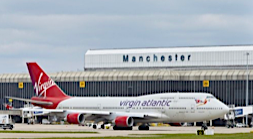Manchester Airports Group (MAG) has called on the UK Government to carry out “an urgent review of its new travel restrictions” as the group released half year results to September 30 showing the continuing effect the measures “are having on the travel and tourism sector.”
Since September 30, MAG said it welcomed 2.7 million passengers in October, the first month since February 2020 in which Manchester Airport and London Stansted Airport each served over one million passengers.
Passenger volumes in November were at 58% of 2019, the closest they have been to pre-pandemic levels.
However, initial data suggests passenger numbers were down by 10-20% across the group following the introduction of Day 2 PCR tests on November 27 and that “this impact has increased further over recent days following the introduction of pre-departure tests this week.”
Figures for the first six months of its financial year to September 30 showed MAG passenger numbers remained 82% down on pre-pandemic levels, despite initial early signs of recovery over the summer.
MAG airports welcomed 6.6 million passengers between April and September, compared to 36.4 million for the same period in 2019.
The group, which owns and operates Manchester, London Stansted and East Midlands airports, saw year-on-year revenues increase £64.9 million to £158.7 million “but the figure was down 70% on the same period two years ago.”
Overall, MAG reported a loss before interest and tax of £75.7 million for the six-month period. By contrast, the group returned £172.7 million in profit for the same six months in 2019.
MAG is privately managed on behalf of its shareholders — Australian investment fund IFM Investors (35.5%), Manchester City Council (35.5%) and nine other Greater Manchester councils (29%).
MAG CEO Charlie Cornish said: “As restrictions eased, passenger numbers grew steadily at all three of our airports.
“The reintroduction of costly and inconvenient travel testing requirements has created further uncertainty and delayed our recovery.
“The Government has talked openly about the damage these restrictions cause to the travel sector, but neither they nor the Opposition have recognised the critical need to support our industry in return.
“As a business, we will always do our part to protect public health, but we also need these temporary measures to be removed when they are no longer worthwhile.
“These restrictions may have slowed the arrival of Omicron but it is now transmitting in the community, and the Government needs urgently to review whether the rapidly reducing benefit of testing justifies the damage it is causing to consumer confidence.
“MAG, and the wider UK travel industry, can be confident of a strong revival when travel restrictions are lifted.
“All we are asking for is to be able to plan for our recovery, and to be given the same chance that every other sector was given through the domestic roadmap earlier this year.”
Manchester Airport served one million more passengers in the first six months of the year compared to the same period in 2020 and, following a 12-month delay, the airport’s new Terminal 2 extension opened its doors to passengers for the first time in July.
“The resumption of leisure travel to the United States, on 8th November, was a significant moment for Manchester Airport’s long-haul network, following the return of long-haul services to the Middle East, Africa and Canada earlier in the year,” said MAG.
“Virgin Atlantic’s services to New York, Orlando and Atlanta have resumed, alongside Singapore Airlines’ service to Houston.
“Aer Lingus also announced in March it was creating a base at the North’s global gateway for direct long-haul services to Barbados and the US, which launched in October and early December, respectively.
“In response to the Government’s announcement of the Integrated Rail Plan last month, MAG reaffirmed its position that the delivery of HS2 and NPR together was essential to driving growth across the North, and welcomed the news that a station at Manchester Airport on the network would go ahead.
“The station will allow passengers quicker and easier journeys to the North’s global gateway, offering cultural and leisure benefits, creating economic growth through direct links to important international markets, and driving the Government’s levelling-up agenda.”
London Stansted Airport served 3.5 million passengers between April and September, up 59% on last year.
The airport’s recovery was the fastest among major UK airports. According to CAA data, in September the UK’s fourth largest airport had seen 43% of its pre-pandemic traffic return.
“East Midlands Airport also saw demand for its popular European holiday destinations return as restrictions eased, with numbers up 33% on 2020, after its passenger operation was paused for six months at the height of travel restrictions,” said MAG.
“The UK’s largest pure freight airport, which was shortlisted for Freeport status in March 2021, has also seen its cargo operation remain strong throughout the pandemic.”
